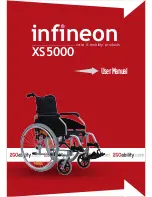
49
ENGLISH
Nitrum / Nitrum Hybrid Rev.C
5.0 Tyres and Mounting
Solid rubber tyres are standard.
With pneumatic tyres always make sure that the tyres have the
correct air pressure, as otherwise the performance of the
wheelchair may be affected. If the tyre pressure is too low, rolling
resistance will increase, requiring more effort to move the chair
forward. Low tyre pressure also has a negative impact on
manoeuverability. If the tyre pressure is too high, the tyre could
burst. The correct pressure for a given tyre is printed on the
surface of the tyre itself.
Tyres can be mounted the same way as an ordinary bicycle tyre.
Before installing a new inner tube, you should always make sure
that the base of the rim and the interior of the tyre are free of
foreign objects. Check the pressure after mounting or repairing a
tyre. It is critical to your safety and to the wheelchair’s
performance that regulation air pressure be maintained and that
tyres are in good condition.
6.0 Maintenance and care
• Check the tyre pressure every 4 weeks. Check all tyres for
wear and damage.
• Check the brakes approximately every 4 weeks to make sure
that they are working properly and are easy to use.
• Change tyres as you would an ordinary bicycle tyre.
• All of the joints that are critical to using your wheelchair safely
are self-locking nuts. Please check every three months to
make sure that all bolts are secure (see the section on torque).
Safety nuts should only be used once and should be replaced
after use.
• Please use only mild household cleansers when your
wheelchair is dirty. Use only soap and water when cleaning
the seat upholstery.
• You should only use genuine parts approved by Sunrise
Medical. Do not use parts from other manufacturers, that have
not been by authorised by Sunrise Medical.
• If your wheelchair should ever get wet, please dry it
afterwards.
• A small amount of sewing-machine oil should be applied to
quick-release axles approximately every 8 weeks. Depending
on the frequency and type of use, we recommend taking your
wheelchair to your authorised dealer every 6 months to have it
inspected by trained personnel.
• If you want to store the wheelchair for a long period of time,
then no further measures are required. Make sure that the
wheelchair is stored at room temperature in a dry place which
is protected from strong sunlight. Before using it again, the
wheelchair should be checked by an authorised dealer.
CAUTION!
Sand and sea water (or salt in the winter) can damage the
bearings of the front and rear wheels. Clean the wheelchair
thoroughly after exposure.
The following parts can be removed and sent back to the
manufacturer/dealer for repair:
• Rear wheels
• Armrest
• Anti-Tip tubes
These components are available as spare parts. For further
information, please see the spare parts catalogue.
Hygiene measures when being re-used:
Prior to the wheelchair being re-used, it must be carefully
prepared. All surfaces which come into contact with the user
must be treated with a disinfection spray.
To do this, you must use a disinfectant from the DGHM list, e.g.
Antifect Liquid (Schülke & Mayr) for rapid alcohol-based
disinfection for medical products and medical devices, which
must be disinfected quickly.
Please pay attention to the manufacturer’s instructions of the
disinfectant you are using.
In general, a complete disinfection cannot be guaranteed on
seams. We therefore recommend that you dispose of seat and
back slings to avoid microbacterial contamination with active
agents according to § 6 infection protection law.
CAUTION!
• Excessive use of chemical or use of incorrect chemicals can
lead to corrosion or degradation of materials used
• Body-fluids can lead to corrosion or degradation of materials
used. Make sure to clean and disinfect all parts of the
wheelchair after contact with body-fluids.
















































